
Mel Gibson proposes a groundbreaking U.S.-Italy film co-production treaty that could inject $10 billion annually into the American film industry while creating a new pathway for filmmakers to escape Hollywood’s stifling environment.
Key Takeaways
- Mel Gibson and Italian producer Andrea Iervolino have proposed a bilateral U.S.-Italy co-production treaty as a “pilot project” for similar agreements with other countries.
- The agreement could bring an estimated $10 billion in annual direct investments to the U.S. film industry, creating new opportunities for both American and Italian filmmakers.
- The treaty offers an alternative to President Trump’s proposed 100% tariff on foreign-made films by instead focusing on cooperation rather than penalties.
- The proposal comes as Gibson prepares to film “The Resurrection Of The Christ” in Italy this summer, highlighting the potential for meaningful cross-cultural projects.
- The agreement aims to be signed at the 2025 Venice Film Festival with representatives from both industries and governments present.
A Strategic Cultural Partnership
Gibson, recently appointed as a “special ambassador” by President Trump alongside Jon Voight and Sylvester Stallone, has partnered with Italian producer Andrea Iervolino to craft a proposal that could transform the relationship between the American and Italian film industries. The treaty is designed to be a “pilot project” that could eventually be replicated with other countries, creating a global network of film cooperation rather than competition. This proposal directly addresses the concerns that prompted President Trump’s consideration of steep tariffs on foreign film production while offering a more collaborative solution.
Instead of punishing filmmakers who work abroad, the agreement would create incentives for Italian producers to make films in the U.S. with American stars, effectively investing in the American film industry while gaining access to its vast market and talent pool. This would create a win-win scenario where both countries benefit from increased production, job creation, and cultural exchange. The timing couldn’t be more perfect, with the political alignment between President Trump and Italian Prime Minister Giorgia Meloni creating favorable conditions for such an agreement.
“The world must recognize that the American entertainment industry has always been the leading one globally: it remains the main point of reference, capable of setting the rules of the industry worldwide. Meanwhile, many countries have established incentive programs to attract foreign productions and have signed bilateral agreements with various nations — but never with the United States. This has essentially left a crucial cultural bridge unresolved. It is therefore essential to initiate a win-win agreement between the USA and the rest of the world. Mel Gibson and I are actively working in this direction, using this initial agreement with Italy as inspiration for the rest of the world,” said Iervolino.
Addressing Hollywood’s Real Issues
While President Trump has expressed concern about the American film industry’s decline, attributing it to foreign incentives drawing production overseas, the proposed treaty acknowledges a more complex reality. Many filmmakers, including Gibson himself, choose to work abroad not just for financial incentives but to escape Hollywood’s increasingly restrictive creative environment. The industry’s internal problems—including high taxes in California, corruption within major studios, and what many conservative filmmakers describe as “toxic wokeness”—have driven talented creators to seek opportunities elsewhere.
The proposed agreement would allow Italian producers to “develop and co-produce international films between Italy and the United States, thus opening new markets; and that it will offer the USA the opportunity to attract new foreign investments, supporting the goals of the Trump agenda.” This approach doesn’t merely protect the existing Hollywood system but instead creates an alternative pathway for filmmakers who want to create content that might not fit within the current studio system’s ideological constraints. For conservatives in the industry who have felt marginalized, this could represent a significant opportunity.
“The Movie Industry in America is dying a very fast death. Other Countries are offering all sorts of incentives to draw our filmmakers and studios away from the United States. Hollywood, and many other areas within the U.S.A., are being devastated,” said Trump.
Reviving a Historical Partnership
The proposed U.S.-Italy film treaty isn’t creating a relationship from scratch but rather revitalizing a historically successful creative partnership. Italian and American filmmakers have collaborated for decades, producing iconic films and musical scores that have defined cinema history. From the spaghetti westerns that revitalized the genre to the legendary compositions of Ennio Morricone, the creative exchange between these two film cultures has consistently yielded extraordinary results. Gibson’s upcoming project, “The Resurrection Of The Christ,” which will film in Italy this summer, continues this tradition.
“allow Italian producers to develop and co-produce international films between Italy and the United States, thus opening new markets; it will offer the U.S.A. the opportunity to attract new foreign investments, supporting the goals of the Trump agenda,” said Andrea Iervolino.
The draft proposal also includes a 10% federal tax incentive for film and TV production and an American “cultural test” to ensure projects genuinely reflect American values. This addresses another concern among conservative audiences—that too many American films no longer reflect traditional American cultural values. By creating financial incentives tied to cultural content, the agreement could help revitalize distinctly American storytelling while still embracing international creative partnerships. If successful, this “pilot project” could inspire similar agreements with other culturally compatible nations.


 News Editor
News Editor




























